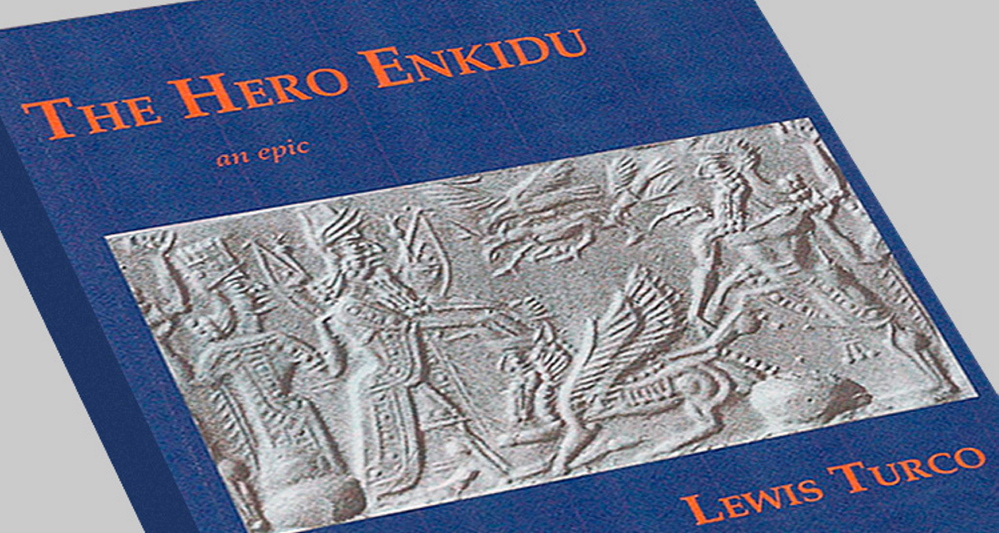“The Hero Enkidu: An Epic”
By Lewis Turco
Bordighera Press, New York, N.Y., 2015
108 pages, trade paperback, $14
The word “epic,” in our day and age, is used to describe something big and somehow vaguely historic. An epic movie. An epic Supreme Court decision. An epic party.
That’s its larger, popular use. Originally, though, it means a long narrative poem usually containing mythic heroes and some kind of historical material. Examples are the “Iliad,” the “Odyssey” and “Beowulf,” which many college students have heard of but few have actually read. “Titanic,” despite the trailers, is not an epic. It’s a romance.
Anyway, new epic poems are scarce nowadays because our view of mythology is kind of clinical and academic. Whereas in ancient times mythology was a way of explaining the universe, in our time the universe is explained by scientists and Fox News. Epic poetry isn’t even pinging on those radars. Classics departments are vanishing into the mists of history.
So “The Hero Enkidu,” by Lewis Turco, of Dresden, is in a vanishingly small literary category: It’s a 21st century A.D. take-off on a 21st century B.C. epic — “Gilgamesh,” to be exact, the oldest existing narrative poem known to scholars. It had been written down by around 2000 B.C. and tells of the exploits of Gilgamesh, who around 2700 BC was the real king of the Sumerian city of Uruk (140 miles or so south of present-day Baghdad).
“Gilgamesh” contains, of all things, an early version of the biblical flood myth. But it was the earlier parts of the poem that got Turco’s attention, where the strange meeting and collaborations of Gilgamesh and his friend Enkidu are told. Both are formidable warriors who battle giants and have direct contact with gods. Turco was intrigued by Enkidu because, while he plays a supporting role in the epic, he is in many ways as complex a character as Gilgamesh. Where Gilgamesh is from the city, Enkidu grew up among wild animals, and they help each other through painful civilizing processes — all told in dreamlike adventure.
So Turco’s re-working of the “Gilgamesh” story with emphasis on Enkidu is interesting in itself, but another fascinating aspect of the book is Turco’s casting of the story in Anglo-Saxon poetic forms. In other hands this might seem like a pretentious stunt, but Turco — author of the widely circulated textbook “The Book of Forms: A Handbook of Poetics” — is not only an expert in prosody but has proven that he handles the language deftly, too. His modern English adaptation of the Old English forms of the “Beowulf” epic is playful, readable and evocative of similarities between far-flung heroes.
Two other notes on this book, about which there is a great deal more for someone else to say.
First, Turco’s imaginative re-creation links “Gilgamesh” history to J.R.R. Tolkien’s mythic Numenor, a quirky and delightful (at least for my part) twist. Uruk in real-world history later became known as Erech, and Erech, as Tolkien readers know, is the place where Aragorn (who’s named in “The Hero Enkidu”) emerges after traveling the Paths of the Dead — a phrase with distinct “Gilgamesh”-like echoes.
Second, I said earlier that Turco’s book is in a sparsely inhabited literary category — but it’s not quite by itself. “The Hero Enkidu” is reminiscent of several last projects in Brunswick poet H.R. Coursen’s productive writing life, including his dramatic adaptations of the “Iliad,” “The Golden Fleece” and the “Aeneid.”
So those of us who like well-made poetry and have a taste for the epic and the ancient are — while not pinging off the walls of cable TV — not exactly alone, either. From my vantage point in that little off-the-radar minority, “The Hero Enkidu” is a fascinating little book.
Lewis Turco fashioned a long, distinguished career in creative writing and teaching. He holds honorary degrees from Unity College and the University of Maine at Fort Kent, and ran the Mathom Bookshop in Dresden until closing it in 2006. “The Hero Enkidu” is available through online booksellers.
Off Radar takes note of books with Maine connections about twice a month in the Kennebec Journal and Morning Sentinel’s What’s Happening? Contact Dana Wilde at universe@dwildepress.net.
Send questions/comments to the editors.



Success. Please wait for the page to reload. If the page does not reload within 5 seconds, please refresh the page.
Enter your email and password to access comments.
Hi, to comment on stories you must . This profile is in addition to your subscription and website login.
Already have a commenting profile? .
Invalid username/password.
Please check your email to confirm and complete your registration.
Only subscribers are eligible to post comments. Please subscribe or login first for digital access. Here’s why.
Use the form below to reset your password. When you've submitted your account email, we will send an email with a reset code.